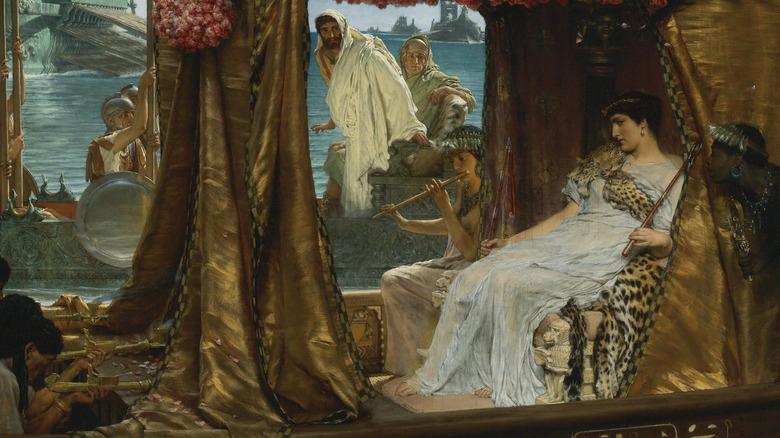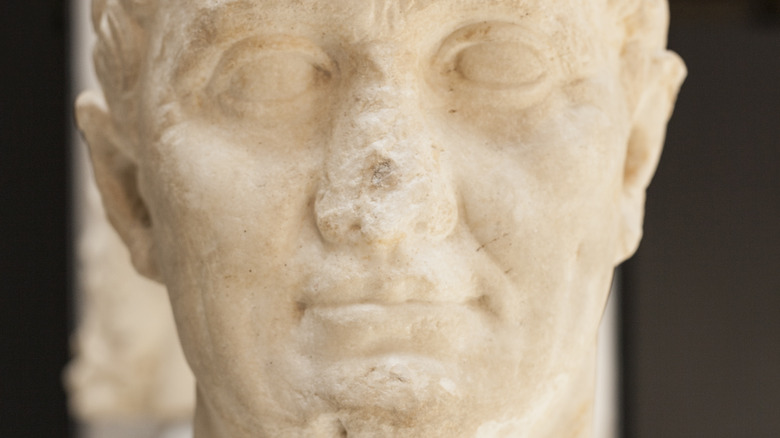Mark Antony And Cleopatra's Love Inspired A New Name For A Small Island
William Shakespeare was, perhaps, the most iconic writer ever to live. According to Britannica, he was baptized in Stratford-Upon-Avon, England, in 1564, where he died at the age of 52. The outlet reports that few concrete facts are known of Shakespeare's early career development, but that in around 1594 he was a known member of the Lord chamberlain's company of players, an esteemed group among London's theatre folk.
The playwright's works, Britannica reports, consist of 37 plays that the "general consensus" agrees to be penned by the man himself. Though perhaps distinctly heavy-going to study today, their beautiful nature and expert craftsmanship is difficult to deny.
Shakespeare wrote on the subjects that continue to captivate today. Tragedy, betrayal, warfare, comedy, and, of course, romance. One of his most iconic romantic tragedies, "Antony and Cleopatra," was based on a true, doomed love between two heavyweights of the ancient world. Echoes of their relationship are still clear to see today.
Mark Antony and Cleopatra's doomed relationship
Mark Antony, per Biography, was a Roman general who had been a close ally of Julius Caesar. For his part, Caesar had been a lover of Cleopatra, queen of Egypt, when he had traveled there in pursuit of foe Pompey the Great (per History). After jumping into Egypt's civil war (Caesar did always find it difficult to avoid warfare wherever he found it), the pair reportedly had a child together, Caesarion, in June of 47 B.C. Cleopatra, it seemed, had been in Rome at the time of Caesar's brutal assassination.
Antony, Octavian Caesar (nephew of Julius), and Marcus Aemilius Lepidus shared power in the 43 B.C. Triumvirate, per Biography. On its establishment, History goes on, Antony met Cleopatra in her kingdom as Caesar had done, and fell in love with her just as Caesar had done.
Ultimately, as in Shakespeare's play, Antony and Cleopatra were defeated by Octavian at the Battle of Actium (per Britannica) in September of 31 BC. Antony, according to History, fell on his own sword, and Cleopatra may have achieved the same thing by means of an asp (as the story goes) in August of 30 B.C. Just three years later, Octavian had changed his name to Augustus and was the first Roman Emperor.
The love between the tragic pair endures, in part because of Shakespeare's classic work. It seems, though, that a Turkish island significant to the pair was named for their love.
Cleopatra's Beach on Cleopatra's Island
Marmaris Info shares a fascinating legend about this stunning area of Turkey. A small island is very close to Marmaris, it seems, and it's commonly known as Cleopatra Island. Why? Because, it's believed, it was a private little haven for the two lovers.
The outlet claims that, per the legend, there's a reason why the sand of this island is so unique and beautiful. Antony arranged that it be so, in order to please his new wife. He supposedly went to the trouble of having Egyptian sand delivered to the beach of this remarkable little stretch of land, in order to give her a taste of home.
Per Forbes, Cleopatra's Island (also known as Sebir Island) is home to Cleopatra's Beach. The sand here –- or, technically, the ooid particles found here, as the outlet tells it –- surely delighted generations over the years, as it may very well have done for the besotted Antony and Cleopatra back in antiquity. Whether there is truth to the tale or not, the pursuit of a perfect island getaway undoubtedly led many couples here. The famous pair would definitely appreciate that.


